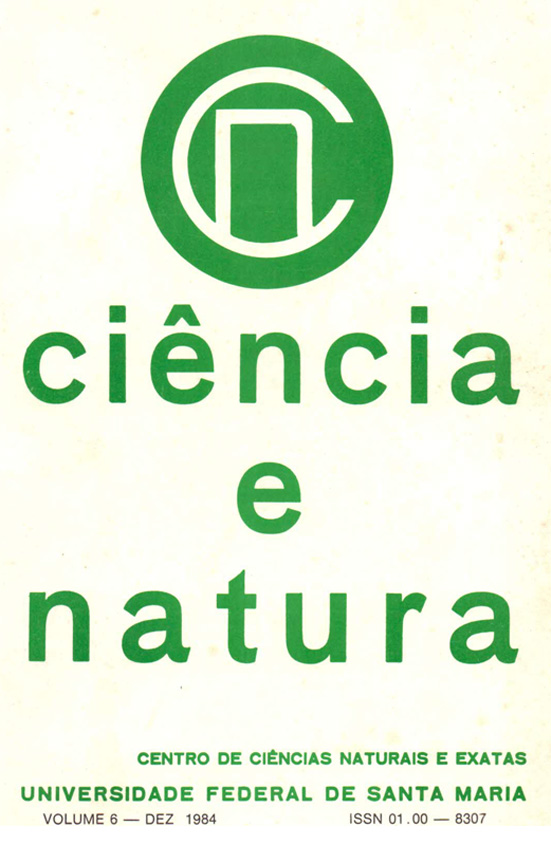Recursive function theory applied to the logical system elementar arythmetic
DOI:
https://doi.org/10.5902/2179460X25032Abstract
The notion of axiomatic systems assumes the notions of effective property and effective rule. In fact, what we really want to know is if a given sequence of symbols is an axiom or if it is not a correct application of a rule. Effective property and effective rule are subject to the recursive function theory. Therefore, the application of this theory to axiomatic systems leads to the demonstration of important results.
The present work, deals with the application of recursive function theory to the logical systems elementar arythmetic, in order to demonstrate that a set of false statments constitutes an un decidable theory and is not axiomatic.
Downloads
References
CENTENARO, I. F. Teoria das Funções Recursivas e Aplicação à Lógica. Campinas/SP. 1977. (Tese de Mestrado-UNICAMP).
CHURCH, A. An Unsolvable Problem of Elementary Number Theory. American Journal of Mathematics, 58: 345-363, 1963.
DAVIS, M. Computability & Unsolvability. MacGraw-Hill Book Company, New York, 1958.
GÜDEL, K. Über die länge von Berweiser. Ergebnisse eines mathematisches Kolloquium , Helf 4: 34-38, 1936.
MYHILL, J. Creative Sets. Zeitschrift Matematische Logik und Grundlangue der Mathematik, 1 : 97-108, 1955.
POST, E.L. Finite combinatory processes-formulation, I. The Journal of symbolic Logic, 1: 103-105, 1936.
ROGERS, H. Jr. Theory of Recursive Functions and Effective Computability. McGraw-Hill Book Company, New York, 1967.
Downloads
Published
How to Cite
Issue
Section
License
To access the DECLARATION AND TRANSFER OF COPYRIGHT AUTHOR’S DECLARATION AND COPYRIGHT LICENSE click here.
Ethical Guidelines for Journal Publication
The Ciência e Natura journal is committed to ensuring ethics in publication and quality of articles.
Conformance to standards of ethical behavior is therefore expected of all parties involved: Authors, Editors, Reviewers, and the Publisher.
In particular,
Authors: Authors should present an objective discussion of the significance of research work as well as sufficient detail and references to permit others to replicate the experiments. Fraudulent or knowingly inaccurate statements constitute unethical behavior and are unacceptable. Review Articles should also be objective, comprehensive, and accurate accounts of the state of the art. The Authors should ensure that their work is entirely original works, and if the work and/or words of others have been used, this has been appropriately acknowledged. Plagiarism in all its forms constitutes unethical publishing behavior and is unacceptable. Submitting the same manuscript to more than one journal concurrently constitutes unethical publishing behavior and is unacceptable. Authors should not submit articles describing essentially the same research to more than one journal. The corresponding Author should ensure that there is a full consensus of all Co-authors in approving the final version of the paper and its submission for publication.
Editors: Editors should evaluate manuscripts exclusively on the basis of their academic merit. An Editor must not use unpublished information in the editor's own research without the express written consent of the Author. Editors should take reasonable responsive measures when ethical complaints have been presented concerning a submitted manuscript or published paper.
Reviewers: Any manuscripts received for review must be treated as confidential documents. Privileged information or ideas obtained through peer review must be kept confidential and not used for personal advantage. Reviewers should be conducted objectively, and observations should be formulated clearly with supporting arguments, so that Authors can use them for improving the paper. Any selected Reviewer who feels unqualified to review the research reported in a manuscript or knows that its prompt review will be impossible should notify the Editor and excuse himself from the review process. Reviewers should not consider manuscripts in which they have conflicts of interest resulting from competitive, collaborative, or other relationships or connections with any of the authors, companies, or institutions connected to the papers.






